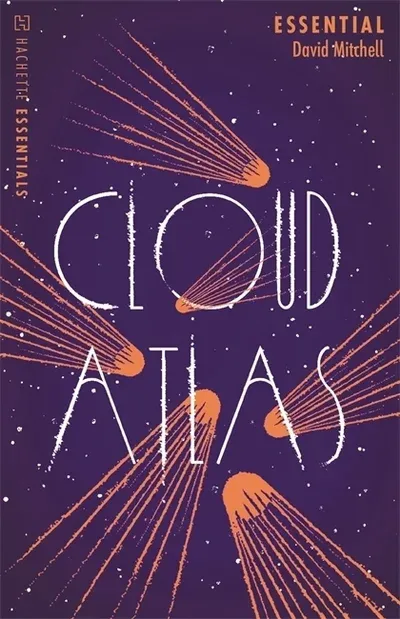At the heart of "Cloud Atlas" is the idea that individual lives are interconnected, forming an intricate and ever-evolving tapestry. The novel is structured as a series of nested stories, each containing the previous one like Russian dolls, and eventually, the stories conclude in reverse order. This ingenious narrative technique allows Mitchell to examine the cyclical nature of time and the interplay between past, present, and future.
The stories take us on a journey through time:
1. The Pacific Journal of Adam Ewing (1850s): The novel opens with the gripping journal of Adam Ewing, an American notary traveling in the Pacific. His experiences aboard a ship and his encounters with various characters expose the dark underbelly of colonialism, racism, and exploitation. Themes of empathy, cultural clash, and the complexities of identity emerge as Ewing grapples with his role in perpetuating or challenging the status quo.
2. Letters from Zedelghem (1930s): The second narrative unfolds through the letters of Robert Frobisher, a talented but troubled young musician who becomes an amanuensis for a renowned composer. Frobisher's letters reveal his ambition, his emotional turmoil, and his complex relationship with the composer Vyvyan Ayrs. The theme of artistic creation and its connections to personal expression and exploitation is brilliantly explored here.
3. Half-Lives: The First Luisa Rey Mystery (1970s): In this gripping thriller, Luisa Rey, an investigative journalist, uncovers a dangerous conspiracy involving a nuclear power plant. The narrative delves into the realm of corporate greed, the ethical dilemmas faced by journalists, and the moral responsibility of individuals to expose corruption and protect the truth.
4. The Ghastly Ordeal of Timothy Cavendish (2000s): This hilarious yet poignant tale follows Timothy Cavendish, a struggling publisher, who finds himself trapped in a nursing home against his will. As he schemes to escape, themes of ageism, societal expectations, and the search for personal freedom take center stage, prompting readers to reflect on the value society places on the elderly and the boundaries of individual agency.
5. An Orison of Sonmi~451 (near-future dystopia): Set in a dystopian society, this narrative unfolds as an interview with Sonmi~451, a clone created to serve in a consumer-driven society. Through her account, the novel delves into themes of oppression, rebellion, and the struggle for autonomy. Mitchell presents a scathing critique of consumerism and the commodification of humanity, while simultaneously celebrating the resilience of the human spirit in the face of oppression.
6. Sloosha's Crossin' an' Ev'rythin' After (post-apocalyptic future): The final story, set in a distant post-apocalyptic future, follows Zachry, a young boy, and his tribe as they navigate a dangerous world after the collapse of civilization. The tale is told in a vivid and distinct dialect, emphasizing the importance of oral tradition and storytelling as a means of preserving knowledge and culture. Themes of tribalism, survival, and the cyclical rise and fall of civilizations resound through this section.
Themes and Symbolism:
"Cloud Atlas" masterfully explores several themes, binding the narratives together like the comet-shaped birthmark that recurs in various characters. Among the prominent themes are the interconnectivity of lives and actions, the consequences of choices and actions that echo across time, the resilience of the human spirit in the face of adversity, and the eternal struggle for freedom and autonomy.The novel also examines the concept of power and its abuse throughout history. Mitchell highlights the ways in which individuals and institutions exploit power dynamics for their gain, whether through colonial exploitation, corporate greed, or the dehumanization of clones in a dystopian society.
The motif of storytelling is a central pillar of "Cloud Atlas." Each protagonist leaves behind a form of narrative - a journal, letters, a thriller novel, an interview, an oral tale - that shapes the understanding of their experiences and impacts the lives of future generations. Through this exploration, the novel celebrates the power of storytelling as a means of preserving history, culture, and collective memory.
Writing Style:
David Mitchell's narrative brilliance lies not only in his storytelling but also in his ability to seamlessly adapt his writing style to match each story's distinct time and genre. From the refined and eloquent prose of the 19th century to the gritty and colloquial dialect of the post-apocalyptic future, Mitchell exhibits unparalleled skill in immersing readers in the unique atmosphere of each narrative.
Critique:
While "Cloud Atlas" has been widely praised for its daring narrative structure and thought-provoking themes, some readers may find the complexity of the interwoven stories challenging to follow. The novel demands active engagement and a willingness to connect the dots between seemingly disparate tales, which might deter readers seeking a more straightforward narrative.
Conclusion:
"Cloud Atlas" stands as a monumental achievement in modern literature, captivating readers with its intricate storytelling, profound themes, and powerful prose. David Mitchell's exploration of interconnected lives and the threads that bind humanity together resonates long after the final page is turned. This compelling novel reminds us of the timeless human struggle for freedom, the consequences of our actions on future generations, and the enduring power of storytelling to shape our understanding of the world. "Cloud Atlas" is an essential read for those seeking an intellectually stimulating and emotionally resonant literary experience.
















